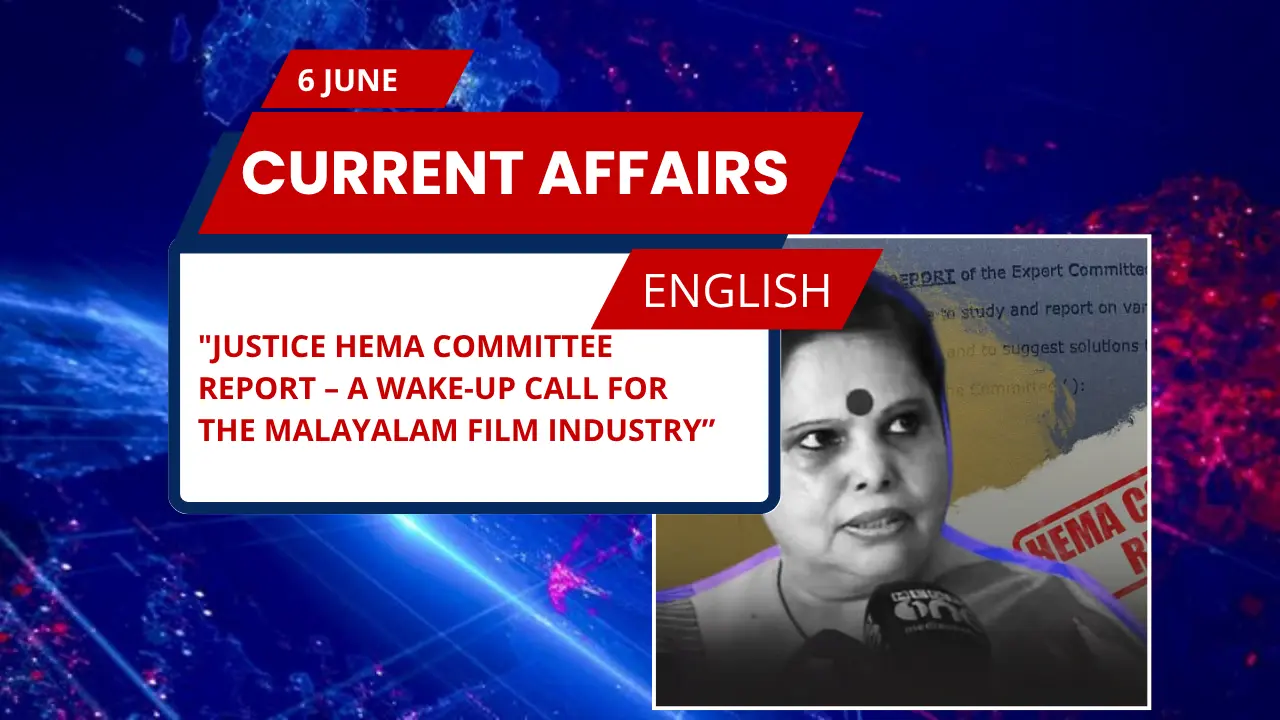
Key Points for SSC & Other Government Exams
- Justice Hema Committee was formed in 2017 after the assault of a prominent Malayalam actress.
- Report submitted in 2019, released in August 2024 after public pressure.
- The committee highlighted sexual harassment and gender discrimination in the Malayalam film industry.
- 35 out of 60 sexual assault cases dropped by Kerala police due to lack of evidence.
- Committee formed on recommendation of the Women in Cinema Collective (WCC).
- Report documents casting couch practices and fear of retaliation.
- First such state-level committee in India for addressing gender issues in cinema.
Complete Details
Formation of the Justice Hema Committee
The Justice Hema Committee was set up in July 2017 following a shocking abduction and sexual assault case involving a top Malayalam actress. The Women in Cinema Collective (WCC), an advocacy group of women in the Malayalam film industry, demanded action from the government. In response, the Kerala government appointed retired judge Justice K. Hema to head a committee to probe gender-based discrimination and harassment in the film industry.
Delay in Report Release
The committee submitted its report in December 2019, but it remained confidential for years due to concerns about the privacy and anonymity of the survivors. Under growing public and activist pressure, the Kerala State Information Commission ordered its release in a redacted format in August 2024.
Major Findings of the Report
The Justice Hema Committee exposed a deep-rooted culture of sexism and exploitation in the Malayalam film industry. It revealed:
- Prevalence of the casting couch.
- Lack of institutional support for women.
- Fear of career damage or retaliation prevented women from reporting abuse.
- Need for internal complaint mechanisms within production companies.
Police Investigation and Dropped Cases
After the report’s release, Kerala police began investigating nearly 60 cases of sexual assault. However, they dropped 35 cases due to insufficient evidence or survivors’ unwillingness to pursue legal proceedings.
Industry & Survivor Reactions
Survivors expressed frustration and disappointment over the dismissal of cases. Many called for systemic reforms, including the setup of Internal Complaints Committees (ICCs) in film production houses. They stressed that police action alone can’t change the culture of fear and silence.
Future Outlook
The report has sparked a larger movement toward ensuring safe, supportive workplaces in the film industry. Activists are pushing for long-term reforms, policy changes, and industry accountability. The report stands as a crucial document in the struggle for gender equality in India’s entertainment sector.
Know About: Kerala (State Mentioned in the Report)
- Capital: Thiruvananthapuram
- Chief Minister: Pinarayi Vijayan
- Governor: Arif Mohammad Khan
- Important National Parks: Periyar National Park, Silent Valley National Park, Eravikulam National Park
- Major Rivers: Periyar, Bharathappuzha, Pamba
- Famous Dances: Kathakali, Mohiniyattam
- Literacy Rate: Highest in India (~96.2%)
Possible Exam Questions (MCQs)
1. The Justice Hema Committee was formed to investigate issues in which industry?
A. Education
B. Film Industry
C. IT Sector
D. Healthcare
Answer: B. Film Industry
2. In which year was the Justice Hema Committee report released to the public?
A. 2017
B. 2019
C. 2021
D. 2024
Answer: D. 2024
3. What was the primary reason for the delay in the release of the Justice Hema Committee report?
A. Political Issues
B. Budget Constraints
C. Privacy Concerns
D. Legal Disputes
Answer: C. Privacy Concerns
4. How many cases were dropped by Kerala police after the report’s release?
A. 25
B. 30
C. 35
D. 40
Answer: C. 35
5. Which organization advocated for the formation of the Justice Hema Committee?
A. Women’s Rights Forum
B. Kerala Human Rights Council
C. Women in Cinema Collective
D. National Commission for Women
Answer: C. Women in Cinema Collective






